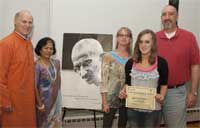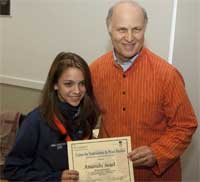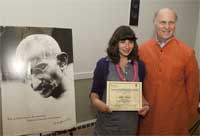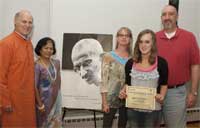Winners from Westerly, East Greenwich, Providence, & East Providence
 KINGSTON, R.I. – June 1, 2011 – At an age when many children are thinking primarily about themselves, a Westerly Middle School eighth-grader has shown she is looking out for the greater good by developing plans for an anti-bullying program and helping families displaced by last year’s historic floods. For her efforts to follow in Mahatma Gandhi’s footsteps and show that her life is her message, Sydni Ulricksen of Westerly has won the University of Rhode Island’s first Gandhi Essay Contest.
KINGSTON, R.I. – June 1, 2011 – At an age when many children are thinking primarily about themselves, a Westerly Middle School eighth-grader has shown she is looking out for the greater good by developing plans for an anti-bullying program and helping families displaced by last year’s historic floods. For her efforts to follow in Mahatma Gandhi’s footsteps and show that her life is her message, Sydni Ulricksen of Westerly has won the University of Rhode Island’s first Gandhi Essay Contest.
URI’s Center for Nonviolence and Peace Studies and the URI Honors Program honored Ulricksen and five other eighth-graders from East Greenwich, Providence, and East Providence for their essays, which were selected from 119 submissions. Students were challenged to write about their interpretation of Gandhi’s written statement, “My life is my message,” and how it applied to their own lives.
“The essays in the top group were very close,” said Paul Bueno de Mesquita, professor of psychology, director of URI’s Center for Nonviolence and Peace Studies, and a contest coordinator. “For our first effort, we found the essays to be very impressive. What I found most interesting were the personal stories.”
Ulricksen’s personal story involved her plans for a senior project to help end bullying, which she called a huge problem in schools: I hope to go around schools in my district, possibly even some around the state, and present audiences of students with facts about tormenting people, and being bullied. I would have speakers that are tormentors, victims, and even people who have witnessed bullying. Consequences for bullies would be explained, as well as consequences for victims. I would break down how to recognize and stop a bully. Showing bullies how what they’re doing is wrong, would be a major point in my presentation. I would give them what they need to figure out why they torment others, and how to fix it. One thing I would make sure to point out, is the emotional weight the bully would have to carry when they’re victim commits suicide or harms themselves and what bullying can do to their future.
As for victims, I would make it clear that it’s okay to tell someone what’s going on, and what could happen, like being assaulted, if they don’t. … If people who are neither bullies nor victims follow the advice that I give them to help victims stop the abuse, and how to stop the bully, my message would be followed much like Gandhi’s. This is something that I want changed, and I will be showing people how I think it should be changed. Therefore, that part of my life will be my message, and I will be the change I wish to see in the world.
Ulricksen’s thoughtful essay and others like it were what Ruby Dholakia, a contest coordinator and marketing professor in URI’s College of Business Administration, was hoping the contest would inspire. She said that issues like hateful speech and bullying must be addressed but the model for addressing them is usually Martin Luther King Jr.
“Here on this campus and in the wider society, people forget that Mahatma Gandhi was the inspiration for Dr. King,” Dholakia said. “We wanted to involve eighth graders since they would be more open to change and maybe have an impact on such devastating issues as bullying.”
Ulricksen also wrote about how her family took in five families displaced by last year’s flooding: Three ended up living with us for about ten days and during that time we provided them with food, shelter, money for their mortgage, and clothing. My brother and I used our free time during that week to set up beds, and areas where we could store their luggage. I spent most of my time helping with the 3 or 4 children that were at my house so the parents could make sure that they had everything they needed. If other people did this, it would have effects on their community, their personal moral, and on the lives of the people they help.
Two second-place winners and three third-place winners were recognized at a May 4 ceremony on URI’s Kingston campus and honored with $100, $50 and $30 respectively and gift certificates to Rasoi and Kabob and Curry restaurants. They included:
Second Place:
Amanda Seigel, Rocky Hill School in East Greenwich
Seigel wrote about the importance of leadership by example. On her middle school’s student council for three years, she strives to treat other people the way she would want to be treated. Her goal is to lead in a quiet and thoughtful way. The message she wants to send is to always try your honest best in your work and in your relationships while trying to see the good in yourself and others.
Isabella Crema, Nathanael Greene Middle School in Providence
Crema’s essay addressed how her family has inspired her to work in the community and become involved with many organizations. One of her great grandfathers fought for workers’ rights by organizing factory workers. As a result, he was blacklisted during the McCarthy years. Another great grandfather bought homes in the Chicago suburbs for people experiencing racial discrimination. Her grandfather is a Canadian genocide scholar, who launched “The Will to Intervene” project, which is aimed at preventing mass atrocities.
Third Place:
Sofia Riva, Gordon School, East Providence
Riva wrote about her very personal struggle to live her beliefs. You may think starting a club at a school would have no effect on the wider world but she discovered that it does. She learned firsthand that eighth graders have important decisions to make and being associated with a controversial cause is difficult. She believes Gandhi’s example can prompt young people to make the right decisions.
Delia Sosa, St. Margaret School, East Providence
Sosa’s grandfather was Elmer Burke, who worked with two other men to establish Rhode Island’s first Black credit union 50 years ago. She wrote about how the men dealt with death threats and harassment in a peaceful and non-violent manner. With Gandhi as a role model, Sosa touched on how she deals with people who are difficult to get along with and how she tries to set a positive example as the vice president of her school’s student council.
Moira Anderson, Providence Country Day, East Providence
Anderson’s essay focused on her efforts to help the environment and leave a small carbon footprint. She wrote about the practical ways she is accomplishing this goal, such as keeping the thermostat low and air-drying clothes. She eats food from local farms and she composts. She tries to help local shelters by donating meals and making fleece blankets for those in need.
URI community members who helped organize the contest were: Libby Miles, associate professor and director of the Writing and Rhetoric program, Diane Kern, assistant professor of education, Arthur Stein, professor emeritus of political science and the Honors Program and Charles Collyer, professor of psychology. In addition, a committee of URI personnel and local community leaders read all of the essay submissions.
Pictured above
For her efforts to follow in Mahatma Gandhi’s footsteps and show that her life is her message, Sydni Ulricksen of Westerly has won the University of Rhode Island’s first Gandhi Essay Contest. (L-R) Paul Bueno de Mesquita, URI professor of psychology and director of URI’s Center for Nonviolence and Peace Studies; Ruby Dholakia, marketing professor in URI’s College of Business Administration; Sydni’s mother Teresa Ulricksen; Sydni Ulricksen; and Sydni’s father Jeffrey Ulricksen.
Amanda Seigel, an eighth grader at the Rocky Hill School in East Greenwich, won second place in the University of Rhode Island’s first Gandhi Essay Contest. Seigel wrote about the importance of leadership by example. She is honored by Paul Bueno de Mesquita, URI professor of psychology and director of URI’s Center for Nonviolence and Peace Studies.
Sofia Riva, an eighth grader at the Gordon School in East Providence, won third place in the University of Rhode Island’s first Gandhi Essay Contest. She wrote about her personal struggle to live her beliefs. She is honored by Paul Bueno de Mesquita, URI professor of psychology and director of URI’s Center for Nonviolence and Peace Studies.
URI Department of Communications & Marketing photo by Joe Giblin Photography.

